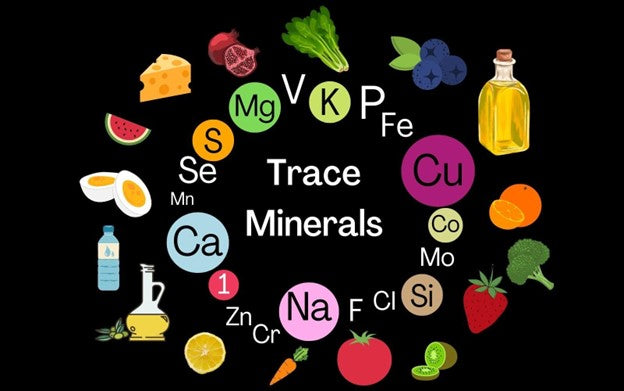The human body needs trace minerals to thrive. We might only need them in small quantities but this doesn't make their significance to our health and wellbeing any less. They're essential to avoid weak bones, a decreased immune system and many other health problems!
Today most people's diets are lacking in trace minerals for a few different reasons such as processed foods becoming increasingly popular and modern agricultural practices removing the highly nutritious fulvic acid from our soil's top layer. Over time this can have devastating effects on our health; therefore, we must find other ways and means of including more trace minerals in our diet.
What are trace minerals? What are the benefits of trace minerals?
Read on and you’ll discover the importance of these tiny little ‘micro minerals’, why you should aim to get sufficient quantities every day and the best supplements on the market today.
Why Trace Minerals are Essential
Trace minerals are crucial for maintaining overall health because they help carry out essential life-supporting physiological functions.
When we don’t consume enough it often leads to a whole host of short and long-term consequences from anaemia and fatigue to poor digestion and weak bones. ( 1 )
However, on the flip side, when your diet is rich in trace minerals it will have a profound positive effect on your health and wellbeing.
Benefits of Trace Minerals
Trace minerals are crucial for survival — they help with important bodily functions, including hormone production, metabolism, muscle contraction, carrying oxygen in the blood, and nerve and thyroid function.
They help you recover from heavy gym sessions — you lose a lot of magnesium through sweating so it’s vital you replenish your stores of this important electrolyte for hydration to help your muscles recover faster post-workout.
Increases bone density — we’ve always been told to drink milk for stronger bones. But studies show that supplementing with trace minerals together with calcium increases bone density in postmenopausal women more than just calcium alone. ( 2 )
Zinc, another trace mineral, has been found to help prevent bone loss. Zinc also aids in the production of collagen, and has been connected with low insulin growth factors, something associated with age-related bone loss. ( 3 )
May decrease risk of cardiovascular disease — Trace minerals play a major role in regulating cardiovascular function with data showing the trace elements, chromium, copper, and selenium, have beneficial effects on risk factors associated with cardiovascular diseases.
Other studies show diets high in potassium-rich foods may help reduce your risk of heart disease and stroke. ( 4 , 5 )
Help with cell metabolism — The most common trace minerals — Iron, zinc, copper and selenium, all play a major role in cell metabolism.
How do you know if you are Mineral Deficient?
The symptoms of a mineral deficiency will be determined by the exact type of nutrients your body is lacking. The severity of these symptoms may vary and be so minor that they go unnoticed.
Some of the possible symptoms include:
- Poor concentration
- Nausea and vomiting
- Diarrhoea
- Impaired immune system
- Constipation
- Bloating and abdominal pain
- Prolonged fatigue and weakness
- Muscle cramping
The 9 Trace Minerals and their Essential Functions
1. Cobalt
Present in the body as a part of vitamin B12, which is involved in the manufacture of blood cells and nervous system function.
2. Copper
Copper is a ‘helper molecule’ for enzymes involved in energy production, connective tissue formation, and iron metabolism.
3. Fluoride
Fluoride is the mineral found in your bones and teeth. It hardens tooth enamel and stabilises the mineral in bones.
4. Iron
Iron is a major component of a type of protein in red blood cells known as haemoglobin. It carries oxygen from your lungs to all parts of the body and is important for healthy brain development and growth in children.
Iron is also essential for the normal production and function of various cells and hormones as well as being a critical component of many metabolic proteins and enzymes.
5. Iodine
The mineral is a component of the thyroid hormone and is required for normal thyroid function — a critical body function.
6. Manganese
This trace element is necessary for normal brain and nerve function as well as a large number of other bodily functions including:
- Bone development
- Wound healing
- Assisting enzymes in metabolism
- Forming sex hormones
- Aids calcium absorption and sugar regulation
7. Selenium
An essential component for various enzymes and proteins that help to make DNA and protect against cell damage and infections.
8. Zinc
Zinc helps your immune system and metabolism function. It also plays a role in foetal development, wound healing, adolescent development and your sense of taste and smell.
9. Molybdenum
Your body uses this mineral to process proteins and genetic material like DNA and to support enzyme production. Molybdenum also helps break down drugs and toxic substances that enter the body.
The Important Role Fulvic Acid Plays
Fulvic acid helps our bodies absorb and utilise nutrients which is vitally important when it comes to trace mineral intake.
This highly nutritious layer of the earth was once abundant in our soil and therefore our diet. However, in recent decades, it has become depleted in the earth due to intensive agricultural practices.
Without enough fulvic acid, we simply can’t adequately absorb vitamins and minerals.
As you can imagine — this isn’t good!
Do Trace Minerals Detox the Body?
Our bodies are meant to get rid of waste and detoxify naturally but unfortunately, these days many people's detoxification pathways are blocked. This can be due to a variety of reasons such as poor diet, stress, dehydration and exposure to toxins.
To help, you must supply your body with adequate amounts of the right minerals.
These minerals provide your body with energy which is needed to detoxify whilst also nourishing the adrenals and thyroid.
In fact, studies show mineral deficiencies to be at the root of every health problem. ( 6 )
So the simple answer is yes trace minerals do help detoxify the body.
Foods Rich in Trace Minerals

|
Foods Types |
Mineral List |
|
Nuts and seeds |
Particularly rich in the trace minerals magnesium, zinc, manganese, copper, selenium, and phosphorus. |
|
Shellfish |
Concentrated sources of minerals, packed with selenium, zinc, copper, and iron. |
|
Cruciferous vegetables |
Good source of many minerals, including magnesium, potassium, manganese, and calcium. |
|
Organ meats |
Amongst the most mineral-dense foods you can eat. They’re also high in protein and vitamins, including vitamin B12, vitamin A, and folate. |
|
Eggs |
Rich in nutrients and minerals, eggs are high in iron, phosphorus, zinc and selenium. Be sure to eat the whole egg as the yolks contain all of the minerals. |
|
Beans |
Abundant source of minerals, including calcium, magnesium, iron, phosphorus, potassium, manganese, copper, and zinc. |
|
Cocoa |
Loaded with minerals and is particularly rich in magnesium and copper. |
|
Avocados |
Rich in magnesium, potassium, manganese, and copper. |
|
Berries |
Great source of potassium, magnesium, and manganese. |
|
Yoghurt and cheese |
Excellent sources of calcium, as well as other minerals like potassium, phosphorus, zinc, and selenium. |
|
Sardines |
Contain almost every vitamin and mineral your body needs to thrive including potassium, magnesium, iron, selenium and phosphorus. |
|
Starchy vegetables |
Provide an important source of nutrients, including minerals like potassium, magnesium, manganese, calcium, iron, and copper. |
|
Fruits |
Great source of minerals, such as potassium, manganese, copper, and magnesium. |
|
Leafy greens |
Loaded with health-promoting minerals, including magnesium, potassium, calcium, iron, manganese, and copper. |
Including more of these food types in your diet will go a long way to greatly increasing your mineral intake but that can be a lot easier said than done.
The typical western diet these days is packed full of processed foods and refined sugar — and completely devoid of trace minerals.
Our soils are also experiencing large levels of fulvic acid depletion due to intensive modern agricultural methods.
What this means is that even if we do manage to get enough minerals through our diet, it won't matter because without adequate fulvic acid our bodies won’t be able to absorb and utilise these nutrients.
But all hope is not lost.
There are a few high-quality supplements out there with sufficient amounts of trace minerals to make life a little easier and your health a lot better.
What are the Best Trace Mineral Supplements to Take?
Living Minerals™ Multi Mineral Complex
Living Minerals™ Multi Mineral Complex contains naturally-occurring fulvic acid and a complete spectrum of 78 essential and trace elements, electrolytes, and amino acids. These minerals are derived from prehistoric plant deposits and are minimally processed to ensure they are superior in purity and bioavailability.
- Fulvic Acid
- Over 70 plant derived minerals
- Minimally Processed
- Pure & Bioavailable
- No Preservatives or Additives
- Nano-sized Colloidal Minerals
- Organic + Vegan
Supplied in bottles of 946ml. 32 servings.
Revitacell Fulvic Restore
Revitacell Fulvic Restore is a powerful concentrated supplement containing high levels of fulvic acid, trace minerals, amino acids, electrolytes and trace elements.
Fulvic restore has been extracted from ancient plant minerals without the use of chemicals making it perfect for boosting nutrient absorption.
A superior benefit that makes this supplement one of the best in its range is the fact that most of the fulvic acid comes in the hydrophobic form, understood to be the most bioavailable (absorbable).
In fact, it is very likely the most concentrated natural fulvic acid supplement on the UK market today!
Features of Revitacell Fulvic Restore include:
- Extracted without use of solvents or chemicals
- High Fulvic Acid content (7% total of which 3.7% is hydrophobic)
- Improves nutrient uptake
- Made in GMP compliant facility in Canada
- Rich in trace minerals, amino acids & electrolytes
- 50-day supply
The Bottom Line
The benefits of trace minerals are manifold. Trace minerals carry out important functions in the body and are essential to stay healthy, strong and energised. But they’re becoming more difficult to obtain from food sources. Taking a high-quality supplement is a great option to correct any mineral deficiencies ensuring you stay in good health.
Written by Kieran Higgins, Health Writer.
Water for Health Ltd began trading in 2007 with the goal of positively affecting the lives of many. We still retain that mission because we believe that proper hydration and nutrition can make a massive difference to people’s health and quality of life. Click here to find out more.
Updated 30/1/25
Sources:
1. Healthline. 2018. Mineral Deficiency. What is mineral deficiency? https://www.healthline.com/health/mineral-deficiency
2. Zofková I, Nemcikova P, Matucha P. Trace elements and bone health. Clin Chem Lab Med. 2013 Aug;51(8):1555-61. doi: 10.1515/cclm-2012-0868. PMID: 23509220. https://pubmed.ncbi.nlm.nih.gov/23509220/
3. O'Connor JP, Kanjilal D, Teitelbaum M, Lin SS, Cottrell JA. Zinc as a Therapeutic Agent in Bone Regeneration. Materials (Basel). 2020 May 12;13(10):2211. doi: 10.3390/ma13102211. PMID: 32408474; PMCID: PMC7287917. https://pmc.ncbi.nlm.nih.gov/articles/PMC7287917/
4. British Heart Foundation. 2014. Potassium-rich foods cut risk of strokes and death for older women. https://www.bhf.org.uk/what-we-do/news-from-the-bhf/news-archive/2014/september/potassium-in-diet
5. Aburto NJ, Hanson S, Gutierrez H, Hooper L, Elliott P, Cappuccio FP. Effect of increased potassium intake on cardiovascular risk factors and disease: systematic review and meta-analyses. BMJ. 2013 Apr 3;346:f1378. doi: 10.1136/bmj.f1378. PMID: 23558164; PMCID: PMC4816263. https://pubmed.ncbi.nlm.nih.gov/23558164/
6. National Library of Medicine. Vitamins, Minerals, And Chronic Diseases. https://www.ncbi.nlm.nih.gov/books/NBK235010/





























Leave a comment